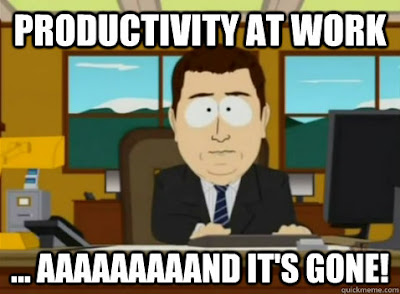Time Strategies: *finish title later
 |
| What a burst of energy - aaaaand it's gone! Image Source : QuickMeme |
I recently read some articles to do with Time Management. This is an aspect of workflow that can be taken for granted, even though it is something that can make or break a project - or even a person. Giving too little time to projects can be detrimental to completing the task by a set date. On the other end of the spectrum, spending too much time working without purposeful breaks and downtime can lead to burning out and fatigue. As well as planning your time effectively, you have to execute your time effectively. That means; Beating Procrastination.
 |
| Caroline Webb - Author Image Source: WikiMedia |
To Make The Benefits Feel More Real:
Try to visualise how great it will be to get it done. Imagining the positive outcomes will make them seem closer and more within your grasp. Pre-committing publicly to complete the task to add some social pressure. We feel that it matters greatly whether we're respected by others - even by strangers. Try to confront the downside of inaction. Actively realise what the consequences are of putting the task off. Will you have twice as much work to do another day? Will it become harder to start the task the longer you put it off?
To Make The Costs Feel Smaller:
Identify the first step. Break down large tasks as small as possible to avoid becoming daunted by them. Ten little tasks seem more manageable than one large one. Tie the first step to a treat. Associate something you take pleasure in with the less appealing activities you must complete. You may actually look forward to starting. Ask yourself why you want to put off these tasks. Identify the blockages or concerns you have and find a way to overcome it.
I genuinely found this article useful. I have had a problem with procrastinating in the past with small things such as responding to emails, as well as larger things such as progress. Thankfully, I have gotten into a much healthier routine over the past few years, but these tips will help me overcome any lingering temptations.
 |
| Amanda Oliver - Writer / Librarian |
Another article about time management that I found helpful is 'Time Management Tips Just for Creatives', by Amanda Oliver. This is a list of very helpful pointers to making the most of the time that you have, and not keep wishing there was more time in the day. Managing energy as well as time is a key way of increasing productivity. Allocate your energy in order from the high value tasks downwards. Rather than making yourself try and slog through work when you are not at peak performance, work when you work best. If you are an early bird, use that to your advantage by getting started on your work first thing in the morning. Alternatively, night owls can take advantage of the long hours of the night to get through tasks undistracted. Don't forget to take breaks - actual breaks! Don't spend your breaks. thinking about your work or trying to cram in a bit more work to get ahead. Switch off and remove yourself to give you and your brain a well deserved (and needed) rest.
Start with the worst or most dreaded tasks. This sounds difficult, and the last thing you would want to do. But getting the hardest things out of the way first will mean they won't continue to linger over you and you won't get tempted to avoid them later. This will also save the best, easiest or favourite tasks for last. Amanda recommends ending your day with a to-do list. This forces you to review what you've done already, and plan what still needs to be done while you are still in the right frame of mind, rather than spending a lot of time trying to remember the next time you come back to it.
Good time management is essential to good, consistent productivity. Different approaches may work for different people. In my own experience, grabbing whatever time I have spare to chip away at tasks works best for me. This reduces the time I have to allocate later on, which is my incentive to keep productive. The more I get done during the day, the more time I have to spend with my family.
- Ultan
- Ultan


Comments
Post a Comment